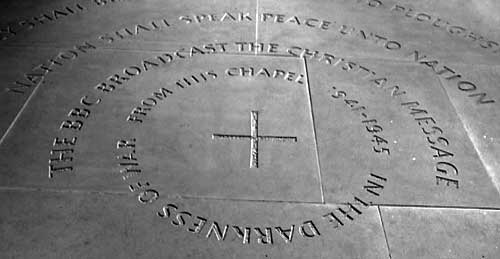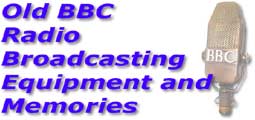I was 15¼ years old and had just been 'recruited' by the BBC as a YIT (Youth in Training) at their secret H Group Transmitter in Bournemouth.
A large concrete pillbox with 2 windows that could only be opened about 3 inches and a door with security spy hole. Situated (and hidden) in the grounds of the local Council's rubbish incinerator. The only clues to its operation were two wires coming from the roof - one thin, short and black attached to the top of a wooden pole some 20 ft away and the other heavy duty Copper supported by insulators swooping away into the sky to the very top of the very tall incinerator's chimney. The Aerial.
Desperate Times.
That was my world from 1942. I think at age 15 I was about the youngest YIT ever recruited by the BBC Engineering, inducted thanks to a passion for radio bits and pieces and crystal sets abandoned from the early 30s, the fun years. Now confronted by the New World, gleaming soft grey and chrome, a piece of RCA American Lease Lend equipment. The Transmitter.
I was trained first by an ex-Merchant Navy Marconi radio officer who had also been scooped up by the war. He first trained me to make a good cup of tea.
Three shifts, night 2300-0900, day 0900-1600, evening 1600-2300.
On the hour every hour using our own dedicated land lines we 'phoned the two secret H group transmitters on either side of us, Weymouth further down the coast and Bartley further up the coast near Southampton. That told us they were still alive and told them likewise about us, also we had to 'phone the local police as well as receive regular knocks on the door as the local coppers on their beats checked us out night and day.
3AM: "Everything OK?", "Yes thankyou", "Goodnight", "Goodnight"
I was told, though I can't vouch for it, being a minor 'sprog' in those days that the concept behind it all, was for these tiny low powered transmitters in the populated southern coastal areas to give local Control over the limited area for a secretly appointed 'Governor' to be able to address and control the local populations in the event of maybe an invasion or commando type operations by the Germans and to do so without having to use the major High power transmitters on the Home service and alarming the whole country. Obviously there was a lot more to it than that, Winston never did give me the full story.
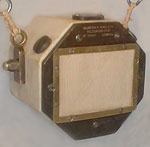
After that, we settled down for the rest of the night, me doing our telephone checks and talking to the coppers, the Engineer having a kip in the EIC's office.
Bournemouth, as it lay between Poole Harbour and Christchurch Bay, two reflecting bodies of water, made it from the air, a highway for the Luftwaffe on its nightly raids on the Midlands and the North and even a return route from London. So we got the occasional bomb as our night-fighters sorted them out.
For the night shift I would leave home at 22.30hrs and bicycle to work, often under an air raid in progress until the all-clear early next morning.
At the transmitter we had an American Hallicrafter Skyrider communications receiver, 'what a beauty' for a 15 year old to play with. Night after night I would listen to German and German controlled stations playing accordion bands or rattling along in German, or tuning in to what was left of the world, or then listening in as our bombers returned from raids and tried to land or were being talked down with wounded aboard.
The only books I was allowed to read at night were Technical and part of my training or I would practice my morse code on a key and buzzer arrangement that had been made by my instructors. This was an important part of our training as we had to be able to operate even if we lost our land lines.
If I remember properly 18 words a minute sending and 15 words a minute receiving was the pass mark. I did a little better than that and once a month we had a test morse transmissision from BH at 12 am on the day. Great fun.
Of course our Engineers who were mostly Marconi trained were fantastic at it, unreal the speeds they could do.
We would start transmitting Home service at 06.30hrs and tiredly wait for the day shift to appear. Then on the bike and home to breakfast and bed.
The day shift was quiet, it was always quiet - we were supposed to be. The EIC would appear at 09.00hrs, (a God like figure to me) and occupy his office and confer or chat with my duty engineer whilst I did the 'phoning and the cleaning and the regular roster of readings from the dials of our gleaming RCA transmitter and made the tea, read my books or, as on night shift, practice my Morse.
Occasionally we would go over to Radio Link which was to simulate the loss of our land line feed of Home Service from London. We had a Beautiful Monster (to my eyes) latest model of civilian radio set which was permanently tuned to the BBC Home Service High power National Transmitter at Brookmans Park North of London. This I only touched on Pain of Death as it was our Link which we switched to the Transmitter and re-broadcast.
If we had a daytime excursion by the Luftwaffe as so many Southern Towns had those days then smartly we had to shut down. I think there was some fear of direction finding, but again as so often on the South coast the Luftwaffe was in over and gone before the sirens could sound.
Of course we signed the Official Secrets Act (at age 15, makes you wonder now) and I never spoke to anyone about my work even to my friends though now 70 years later I wonder how much a real secret it was, but at 15 it was all Fun.
So a wonderful year it was for a young chap interested in radio. Then, in spring 1943, I travelled to London along with a fellow YIT to meet a Mr. Florence of Engineering division to take the Technical Assistant Class 2 exam, and saw for the first time Broadcasting House. It will be hard for any young person reading this today to understand, but there it was. The Centre in the war years of the spoken word that told the rest of the world we were still alive and kicking. I was guided at BH to Bentinck House in a side street next to BH to meet my examiner. Anyway a week later I was informed that I had been successful. The other chap wasn't. There I was at 16¼ a 'fully fledged' TA 2. I lasted one more month at the H Group and then a letter ordering my transfer to Brookmans Park High Power transmitter as a TA 2, so off I went to London.
Brookmans Park
External link
A large hall, down one side along its length metal panels with windows to observe the workings of an interior that demanded valves so big they had to be wheeled in on trolleys, (remember to switch off first) and set back from them in the hall, control desks at which sat the Engineers who controlled it all.
Well at 85 years memory might play me false, but there was an initial interview with a Supreme Being AKA the Engineer in Charge. After that I was not allowed yet into the gleaming purlieus of the transmitter hall but consigned, as was right and proper to one of my lowly technical antecedence, to the Machine Hall where dwelt the giant machines that supplied the power to operate it all. There for the next month or so I tended them under training supervision, cleaning giant copper commutators the dust of which made everything I ate taste sweet until, 'sweet' relief, I was summoned to be told and handed a 'memo' to say I had been selected (as it turned out with many others) to attend a 3 month training course starting at the studio centre at Maida Vale, London. My future after that was not even mentioned.
For those of you old enough to remember - this was 1943.
So off again in May to central London where a confusion of young people, (too young to be called up) milled around in a large room in Maida Vale then to be organised into a technical course.
Evesham
About a month there and then we were sorted again by what criteria I'll never know. I was transferred to become a Control Room Engineer and so a bunch of us was sent on to the BBC's secret wartime station in glorious Evesham in the heart of England for a further 2 months training, whilst others went on to Droitwich for Transmitter training. There ended my career in transmitter training, so we, who thought we were masters of the Universe in high frequency work, now had drop our sights to the low frequencies of ordinary amplifiers.
Never mind, the Beer in Evesham was great.
This BBC secret was guarded by real soldiers with real guns and an electrified wire fence that tinkled things in the guard house. I believe there were some initial 'experts' using their recently acquired electrical knowledge to play pranks but this was a severe NO NO and stopped quickly.
It was however a most daunting moment to return to our billets outside the perimeter of this guarded area after a night in Evesham to be greeted by a strong flashlight and commands by one soldier whilst away from him in the shadow was another soldier with a machine-gun.
Well, after 2 months of these 'Elysium Fields' where the war appeared so far away, we finished the course and we were all sent our separate ways to various BBC centres according to the whims of those in charge.
Bedford
I and Tom Edwards (from Wales) and another called Bob Monks were sent to BBC Bedford. After all these years Tom and I still keep in touch.
I never knew there was a BBC presence in Bedford, in fact I had to look up Bedford on the map and there it was 50 miles north of London.
I left Evesham in August for a two week holiday or Leave as we used to call it at home and then at the back end of August off to Bedford, a Control Room TA 2.
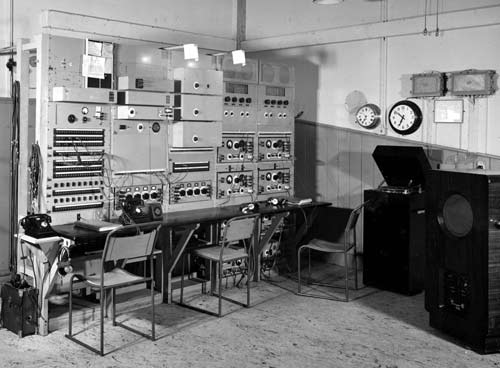
As I had no 'digs' to go to a bed for the night was the first essential and this was furnished by a rest room above the C/R. So began my sojourn at BBC Bedford.
BBC Bedford was then to my surprise and to many others the largest wartime BBC region outside London, housing The BBC Symphony Orchestra with its conductor Sir Adrian Boult, the BBC Theatre orchestra and Stanford Robinson (AKA as the Black Prince) and Choir, the BBC Singers and the BBC Religious Dept. and then to be joined in the following year with the Band of the AEF under Major Glenn Miller. It was also more important from a total BBC network point of view a major hub of the wartime broadcasting Network, eventually taking over responsibility for the repeater stations of Cambridge and Northampton all of which served the north of the U.K.
First things first, next morning to meet the EIC Rex Howarth and Tommy Higgs, his deputy, both very kind and considerate. Then, accompanied by the Defence officer, to my 'Digs' as allocated now by law on those who had spare rooms. Often not a happy arrangement, also I was given a BBC Bicycle, vital as Bedford Studio Centre consisted of a number of Outside Broadcast studios spread over the town.
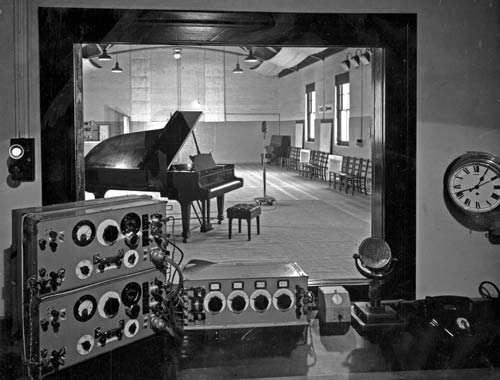
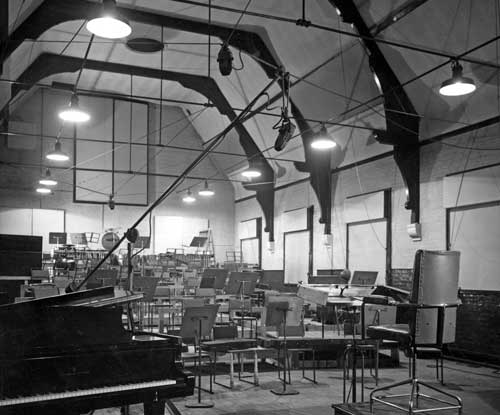
The Control Room was on the ground floor, a large room with a single L shape equipment bay, which included the control desk for one TA2 to sit and answer all the incoming traffic from London and Aldenham and the North. Then a couple of positions for TAs like myself to sit and monitor the output from our OB studios, particularly when they went to air. In the middle of the room a large desk at which sat the duty Engineer.
That in a thumbnail was BBC Bedford.
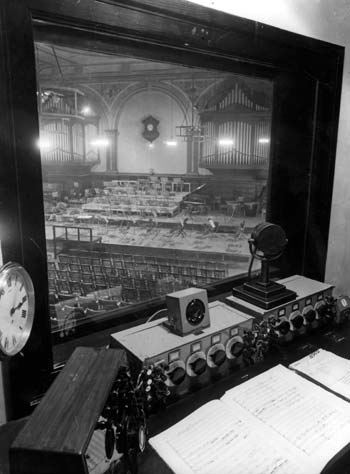
So I settled into life at Bedford, not the most glamorous of towns but relieved by the presence of the River Ouse with its promenade area and attendant boating which was an instant attraction.
Often doing Outside Broadcasts at munition plants and other such government installations in the area. In one such we had to don special protective clothing and were searched for matches and our equipment was subject to suspicion in order to do a "Workers Playtime", the star of which was Marie Lloyd Junior a former star of the Music Halls singing her song "A Little of What You Fancy Does You Good". I doubt if any reader is still alive to remember such, because even at 16 years I didn't. The opposite was very special: visits to Kings College Cambridge to broadcast Evensong. I remember how quiet it was in those winter afternoons as it was getting dark and such a small attendance due to the war.
Then of course at an advanced 16 years I had to join, as all my fellow TA2s did, the BBC Home Guard. Oh Dear! Oh Dear! There's glory for you. I swear that when I first saw that wonderful exposé on TV of "Dads Army" I was certain the writers must have been hidden in our midst.
I was given a uniform, an American Remington rifle and five rounds of ammunition. I wonder how many mothers today would approve of seeing their sons bicycling off to work with a rifle slung over their shoulder and a clip of ammo. in their pocket.
Our CO, a lieutenant, was from the second strings of the orchestra and most of the unit were musicians, which made it very difficult to get a full turnout due to broadcasts. The Sergeant was the senior orchestral porter and thank goodness was an old sweat from the first war, so he kept us from looking complete idiots.
My favourite memory is prowling round the suburbs of Bedford on evening manoeuvres with the Army. At the end of my rifle was a loop of string with five crackers on it. When we saw one of the 'professional' soldiers we pulled the string and 'CRACK' they were dead. As I said, Oh Dear!
We never seemed to suffer much in the way of air raids as whilst we were surrounded by airfields, both RAF and American, there was not a lot of production of wartime significance for the Luftwaffe to bomb. Though I do remember our consternation when during the Doodlebug season, one night we heard the familiar (at least to me) two stroke of one coming over Bedford, luckily to land well clear of town. I think the Germans were then being pushed North by the Canadians in France and were experimenting by sending them off from the Low Countries.
Then of course we had the V2 rockets. Not that we had them at Bedford, it was poor old London that was getting them. We found that if we climbed at dawn to the very top of the gable roof of the John Bunyan Meeting House, which for some of us idiots was about the daftest thing we could do as we had to climb outside on the actual roof, it was possible when looking directly into the rising sun to see high in the stratosphere the thin vapour trails from these rockets as they were on their way up from the Low countries before turning over to descend on London. What a war!
As our OB studios had to have Firewatchers against incendiary attack every night we found this was a way for us youngsters to augment our meagre incomes. For 2 shillings (10p) a night we slept on a bed in the studios. My favourite was the major orchestral studio, the Bedford Corn Exchange, big, dark and spooky. We had a bed in the small room off stage which during the public concerts doubled as the conductor's dressing room. I remember I had one 3 month period when I never slept at my 'digs' but Firewatched at different studios every night. 14 shillings a week was good money in those days, which we collected from the Defence Dept.
Then, in 1944, we had Glenn Miller, or I should say the band of the AEF led by Major Miller.
This was of course a vivid splash of colour for our wartime lives with a little bit of Hollywood thrown in. The BBC settled the band at the Co-Partners studio where we broadcast to the BBC and AFN (American Forces Network). It is to my memory a very happy arrangement as we were in the BBC, used to working with top class professionals and this band was certainly that, first class musicians as in our orchestras. I remember their string ensemble 'Strings With Wings' was formed by 'fiddlers' from most of the prestigious American Orchestras. Some were a little disgruntled as violinists who signed up in America to fight suddenly found themselves playing dance music in the AEF band but even Sir Adrian Boult expressed his admiration for their brass section when he heard it one day at rehearsal.
We had some pleasant times sitting on the grass outside the studio during rehearsal breaks chatting about the war and life in America.
As for Hollywood, well I remember working with Bing Crosby and chatting to him. As junior engineers we were all interested as to whether that lovely deep voice was natural or the product of microphone technique and so I was careful as to where I put his microphone. Well it was natural, and he was, as so many top artists are, very easy and good to work with.
We, on the other hand, as youngsters were a little blasé. We got his autograph on the little white circle that was on the Ten Shilling note, which we then sold for twelve and sixpence. War Profiteering. Well, as TA2s on two pound ten shillings a week with digs and food to pay for we were always short of dough.
Then came the evening of the official debut of the Band to be held and broadcast from the Bedford Corn Exchange with all the local dignitaries, film stars American and British, David Niven (on leave) in uniform, Dinah Shore and others, General Eaker of the 8th Air force and enough top brass for a band.
I was taking a few days leave in London when Tommy Higgs the assistant EIC phoned me and asked me to come back to be the OB engineer for the occasion which of course I was very pleased to do and it was grand to have such show and colour. At the reception after the Broadcast I felt like a little grey mouse among all that brass and ribbons as I tried to snaffle a sandwich.
Well, whilst all this was going on we had a war to win. D-Day arrived. Actually it arrived for us at the Control room a week before as special security came into force and our C/R was guarded by a policeman as well as our door staff and our BBC passes were tested.
A new Network called ORANGE was secretly to come into force we knew not when, but then on the day it did, a stream of cryptic messages about "little white rabbits" or "Jean had to change his shirt", all for the 'Maqui' or 'Resistance'. Very exciting, so, as we were an important hub of the network, the authorities decided to upgrade our security.
Still listing the milestones of life at Bedford came the 'freedom' or if you will the 'relief' of Paris and the first concert from our erstwhile allies at, again, the Corn Exchange with the BBC Symphony Orchestra and conductor Charles Munch flown directly from Paris with a charming young blonde lady who played the Tchaikovsky piano concerto, not very well, to tumultuous applause. Followed a week later, again with Munch and an attractive 'middle' aged lady who played the Ravel piano concerto very well. Remember I was very young at the time, for both occasions I was the OB engineer.
I remember phrases like 'Entente Cordiale', of which I knew not, being bandied about. Well, after all these years what a good idea, could have done with some in 1940.
Then in December came the news that Major Glenn Miller was missing.
I was having dinner with the assistant Engineer in Charge Tommy Higgs in the BBC canteen, we were alone and the 'phone rang. He got up to answer it, came back and said Miller is missing. I'm afraid we were not particularly concerned, it may upset some who read this but many of us had formed the impression that Major Miller was not a very nice man. Right from the first time the Band was established at Bedford this was evident. We OB engineers spent hours with the musicians, sitting on the grass outside Co-Partners during breaks, 'Chewing the Fat' was the American expression then, and it was apparent that he was not liked even by some members of his own Band. For some reason he disliked the British or English intensely and the remark attributed to him about the Blitz in London when he first saw it, was "it was a pity the Germans hadn't finished it" did not endear him to his hosts.
We did not see too much of him at Bedford as he rarely conducted or appeared with the band at the many broadcasts we did from the Co-Partners OB studio. It was just the public functions for him, as he appeared to spend most of his time in London. The Band was looked after or supervised by a chap named Jerry Gray, the music arranger. He was an extremely courteous and accomplished organiser and we all responded well to him. We got on extremely well with all the band and the little ensembles like Sgt. Ray McKinley and Mel Powell and Strings with Wings and the singer whose name escapes me, so we were all very sorry when the time came for the Band to be air lifted to Europe to follow the GIs. It was a great experience for us young blokes to have a touch of stardust.
So 1945 moved along.
The war in Europe dragged to its end and the various departments drifted back to London - Orchestras, Singers, Religious Department, et al.
I sat in the C/R with fellow Engineers and listened to the six o'clock news which announced the Atom bomb and knew as a technician that the world was now a different place and all the wars were over until the next time. All over.
After the War
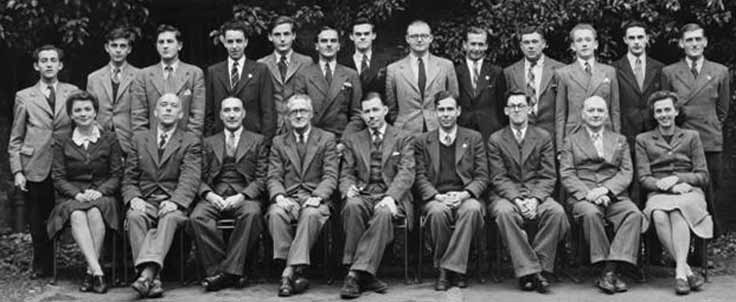
The Bedford Engineering Division team in September 1945. Frank is third
from the left, back row.
We carried on dismantling the studios, returning equipment to London. I was reassigned to London Outside Broadcasting unit and then the RAF decided their need was greater and so off I went.
After 2½ years in the RAF, mostly in Japan and French Indo China, I realised that for some 6½ years I had worn some sort of uniform, Auxiliary Fire Service Message Boy 2 years, BBC Home Guard 2 years and then the RAF 2½ years so now in 1948 back to Auntie who decided this time I should be a Recording Engineer. So off again for re-training and then to the Recording Unit in the bowels (90ft down) of 200 Oxford Street, Headquarters of the BBC Overseas Broadcasting Section.
Now I had served in the three main Engineering sections of the BBC, Transmitters, Control Room and Recordings and then some 4 years later a transfer by my wishes to Programme Enginering which the BBC then moved out of Engineering into a programme department and so I became a Studio Manager at Overseas Broadcasting.

Frank Doran
I cannot leave this account without expressing my deep appreciation of the privilege I feel even now at having spent those early wartime years with the finest independent Broadcasting organization in the world. It is impossible for today's listener to the cacophony of so called Commercial Broadcasting to comprehend the impact even in the 1930s on the families of ordinary Britons of such an organization as the BBC, independent of politics, dedicated to good quality family broadcasting. To Educate, Inform and Entertain and then in the war years to become not only the single cohesive force that bound the nation together in war but to become to the world a Beacon, a Lighthouse that told the world that all was not lost, we would survive and Win.
Frank Mills Doran.
